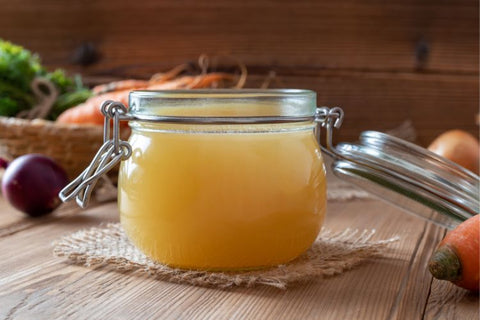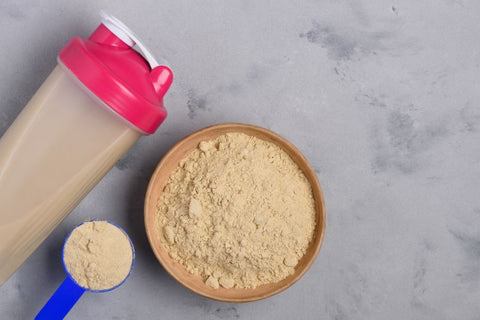Protein is a vital building block in the human body, playing a crucial role in everything from muscle growth and repair to enzyme production and immune function. Whether you're a gym enthusiast, a busy professional, or simply looking to optimize your health, ensuring adequate protein intake is key.
Two popular protein sources have emerged in recent years: bone broth protein and whey protein. Bone broth protein, derived from simmered bones, boasts potential benefits for joints and gut health. Whey protein, a byproduct of cheesemaking, is a well-established muscle-building powerhouse.
This article dives into the nutritional benefits of each protein source, exploring their suitability for different dietary needs and fitness goals. We'll compare their protein content, amino acid profiles, and additional nutrients to help you decide which protein powder might be the best fit for you.
Choosing the Right Protein Source for Your Needs
Protein is an essential nutrient that plays a crucial role in building and repairing tissues, enzymes, and hormones in our body. It also helps us feel full and satisfied after eating. When it comes to choosing a protein source, there are two popular options: bone broth protein and whey protein. Both offer distinct benefits, and the best choice depends on your specific goals. Here is a breakdown:
Source:
- Bone Broth Protein: Derived from simmering animal bones, tendons, and ligaments. This process extracts collagen and other nutrients from the connective tissues. Bone broth protein is appealing to those following paleo or dairy-free diets.
- Whey Protein: Sourced from milk during cheese production. Whey protein is a complete protein, meaning it contains all nine essential amino acids your body cannot synthesize on its own. This makes it ideal for muscle building and repair.
Nutrient Profile:
- Bone Broth Protein: Lower in total protein content compared to whey protein, but richer in specific amino acids like glycine, proline, and hydroxyproline. These amino acids are the building blocks of collagen, which is important for joint, bone, and skin health. Bone broth protein may also contain beneficial minerals like glucosamine and chondroitin, which can further support joint health.
- Whey Protein: Higher in total protein content and particularly rich in Branched-Chain Amino Acids (BCAAs). BCAAs are readily absorbed by the body and play a crucial role in muscle growth and recovery after exercise.
Collagen Content
Bone broth protein contains collagen. This is one of its key selling points. As mentioned before, bone broth is made by simmering animal bones, tendons, and ligaments – tissues rich in collagen. This collagen is then concentrated when the bone broth is turned into protein powder.
The collagen in bone broth protein offers several potential health benefits:
Joint Health: Collagen is a major component of cartilage, the cushiony tissue that protects your joints. By providing your body with the building blocks for collagen, bone broth protein may help maintain joint health and potentially reduce discomfort.
Skin Elasticity: Collagen plays a vital role in keeping your skin plump and youthful. Bone broth protein, with its collagen content, may help improve skin elasticity and reduce the appearance of wrinkles.
Gut Health: Some studies suggest that bone broth protein may contain beneficial compounds that support a healthy gut microbiome, potentially aiding digestion and immune function.
The key nutrient that whey protein lacks compared to bone broth protein is collagen. Whey protein is a complete protein, meaning it contains all essential amino acids, but it doesn't have a significant amount of collagen. This is why bone broth protein is often chosen for its potential benefits related to joint health, skin, and gut, while whey protein excels in muscle building and repair due to its high BCAA content.
Digestibility
There are a couple of reasons why bone broth protein might be easier to digest for some individuals compared to whey protein:
-
Lactose Content: Whey protein is derived from milk, and lactose intolerance is a common issue. People with lactose intolerance have difficulty digesting lactose, a sugar found in milk. This can lead to digestive discomfort like bloating, gas, and diarrhea. Bone broth protein, on the other hand, is typically lactose-free, making it a suitable option for those with lactose intolerance.
-
Potential for Less Whey-Specific Sensitivities: While less common than lactose intolerance, some people may have sensitivities to other components found in whey protein. These sensitivities can also lead to digestive issues. Bone broth protein, coming from a different source entirely, might be better tolerated by those with these sensitivities.
Who Should Choose Bone Broth Protein Over Whey Protein (Due to Dietary Restrictions):
-
Individuals with Lactose Intolerance: As mentioned earlier, if you have lactose intolerance, bone broth protein is the way to go to avoid digestive discomfort.
-
People Following a Dairy-Free Diet: Whether due to ethical reasons, allergies, or personal preference, those following a dairy-free diet would naturally choose bone broth protein over whey protein.
Ultimately, the best way to determine which protein source is easier for you to digest is to try them both and see how your body reacts.
Nutrient Diversity
While both bone broth protein and whey protein are popular choices for protein supplementation, they offer more than just protein. Each boasts a unique nutrient profile that caters to different health goals. Let's delve into the additional nutrients found in bone broth protein and how it compares to whey protein in terms of nutrient focus.
Here's a breakdown of the key points:
- Collagen Peptides: As the name suggests, bone broth protein is rich in collagen peptides. These are broken-down collagen molecules readily absorbed by the body. Collagen provides structure and support to joints, skin, and connective tissues.
- Glucosamine and Chondroitin: Bone broth may also contain glucosamine and chondroitin, which are compounds found in healthy cartilage and can potentially support joint health.
- Minerals: Depending on the source and processing, bone broth protein may contain various minerals like calcium, magnesium, phosphorus, and potassium. These minerals are essential for various bodily functions.
Joint and Gut Support
The collagen in bone broth protein may contribute to joint and gut health, which may not be a specific benefit of whey protein.
Joints:
- Building Blocks for Cartilage: Collagen is a major component of cartilage, the cushiony tissue that protects the ends of your bones and allows them to glide smoothly against each other. By providing the building blocks for collagen, bone broth protein may help maintain healthy cartilage and potentially reduce joint discomfort.
- Anti-inflammatory Potential: Some studies suggest that collagen peptides may have anti-inflammatory properties. This could be beneficial for those with conditions like osteoarthritis, which involves inflammation in the joints.
Gut:
- Gut Lining Support: Collagen may play a role in maintaining the integrity of the gut lining. A healthy gut lining acts as a barrier against harmful substances and pathogens. Bone broth protein, with its collagen content, might contribute to a healthier gut barrier.
- Microbiome Support: Some research suggests that collagen peptides may have prebiotic properties, meaning they could serve as food for beneficial gut bacteria. A healthy gut microbiome is crucial for digestion, immune function, and overall health.
Flavor and Processing
Protein powders offer a convenient way to boost your protein intake. But beyond the nutritional benefits, the taste and processing methods can also influence your choice. Here's a glimpse into the flavour world of whey protein:
- Classic Flavors: Vanilla, chocolate, and strawberry are timeless favourites that remain popular choices. These classic flavours offer a versatile base that can be easily mixed with water, milk, or blended into smoothies.
- Dessert-Inspired Flavors: Craving something sweet? Whey protein comes in flavours like cookies and cream, peanut butter cups, birthday cakes, and even red velvet cakes. These dessert-inspired options satisfy your sweet tooth while providing a protein boost.
- Fruity Flavors: For a refreshing twist, there are various fruity whey protein options like mango, peach, mixed berry, and watermelon. These flavours are perfect for adding a fruity kick to your protein shake or smoothie.
- Unique Flavors: The world of whey protein flavours extends beyond the classics. You might find options like cinnamon roll, salted caramel, matcha green tea, or even pumpkin spice latte.
Bone broth protein generally has a less diverse flavour profile compared to whey protein. Here's what you can expect:
- Savoury Focus: Bone broth protein often leans towards savoury flavours that reflect its origins. Common options include beef, chicken, and vegetable broth flavours. These flavours can be easily incorporated into savoury dishes like soups, stews, or sauces.
- Limited Sweet Options: While some bone broth protein brands might offer a limited selection of sweet flavours, they are not as prevalent as whey protein.
Processing Methods: From Source to Powder
Both whey protein and bone broth protein undergo different processing methods to become the powders we consume:
Whey Protein Processing:
- Cheese Production: Whey is a byproduct of cheese production. During cheesemaking, milk curdles, separating the curds (used for cheese) from the liquid whey.
- Filtration and Concentration: The whey is then filtered and concentrated to remove lactose, fat, and other unwanted components.
- Drying: The concentrated whey is then dried using various methods like spray drying or freeze drying, resulting in a whey protein powder.
- Flavouring and Mixing: Finally, flavours, sweeteners, and other ingredients may be added to the whey protein powder before packaging.
Bone Broth Protein Processing:
- Simmering Bones: Bones, tendons, and ligaments are simmered in water for an extended period, typically several hours. This process extracts nutrients and collagen from the connective tissues.
- Straining and Filtration: The resulting bone broth is then strained and filtered to remove any bone fragments or debris.
- Concentration and Drying: The bone broth is then concentrated and dried using methods like spray drying or freeze drying, similar to whey protein.
- Powder and Potential Flavoring: The resulting powder is bone broth protein. Depending on the brand, some flavourings or additional ingredients may be added.
In essence, whey protein processing focuses on separating and concentrating protein from whey, while bone broth protein processing aims to extract nutrients and collagen from simmered bones before drying it into a powder.
Conclusion
When debating between bone broth protein and whey protein, consider your dietary preferences, nutritional goals, and potential health benefits. While whey protein excels in muscle repair and growth, bone broth protein offers collagen-rich benefits for joint, skin, and gut health. Ultimately, the right choice depends on what aligns best with your lifestyle and fitness objectives.
Key Takeaways
When comparing bone broth protein and whey protein, several key takeaways emerge:
- Bone broth protein is lower in total protein content compared to whey protein but contains specific amino acids like glycine, proline, and hydroxyproline, essential for joint and skin health. Whey protein, on the other hand, is richer in total protein and Branched-Chain Amino Acids (BCAAs), ideal for muscle repair and growth.
- Bone broth protein is notable for its collagen content, offering benefits for joint, skin, and gut health. Collagen is a major component of cartilage and plays a vital role in maintaining skin elasticity.
- Bone broth protein is typically lactose-free, making it suitable for individuals with lactose intolerance. It may also be better tolerated by those sensitive to components found in whey protein.
- Beyond protein, bone broth protein may contain glucosamine, chondroitin, and various minerals, supporting joint and overall health. Whey protein offers a more concentrated source of amino acids crucial for muscle recovery.
- Whey protein comes in a wide range of flavours and is versatile for use in shakes and smoothies. Bone broth protein tends to have savoury flavours, suitable for incorporating into savoury dishes.






